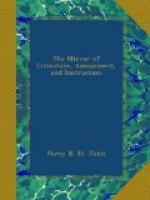And then for amusement—perchance
it was cold—
In a circle they seemed to
advance;
The poor and the rich, and the young and
the old,—
But the grave-clothes impeded
the dance:
And as no person thought about modesty
there,
They flung off their garments, and stripped
themselves bare,
And a shroud lay on each heap
of mould.
They kicked up their heels, and they rattled
their bones,
And the horrible din that
they made
Went clickety-clackety—just
like the tones
Of a castanet noisily played.
And the warder he laughed as he witnessed
the cheer,
And he heard the Betrayer speak soft in
his ear,
“Go and steal away one
of their shrouds.”
Swift as thought it was done—in
an instant he fled
Behind the church portal to
hide;
And brighter and brighter the moon-beam
was shed,
As the dance they still shudderingly
plied;—
But at last they began to grow tired of
their fun,
And they put on their shrouds, and slipped
off, one by one,
Beneath, to the homes of the
dead.
But tapping at every grave-hill, there
staid
One skeleton, tripping behind;
Though not by his comrades the trick had
been played—
Now its odour he snuffed in
the wind:
He rushed to the door—but fell
back with a shock;
For well for the wight of the bell and
the clock,
The sign of the cross it displayed.
But the shroud he must have—not
a moment he stays;
Ere a man had begun but to
think,
On the Gothic-work his fingers quickly
he lays,
And climbs up its chain, link
by link.
Now woe to the warder—for sure
he must die—
To see, like a long-legged spider, draw
nigh
The skeleton’s clattering
form:
And pale was his visage, and thick came
his breath;
The garb, alas! why did he
touch?
How sick grew his soul as the garment
of death
The skeleton caught in his
clutch—
The moon disappeared, and the skies changed
to dun,
And louder than thunder the church-bell
tolled one—
The spectre fell tumbling
to bits!
[and one of the prose tales, abridged:]
BEATRICE ADONY AND JULIUS ALVINZI.
There is not in all Germany a more pleasant station for a regiment of horse than the city of Salzburgh, capital of the province of that name, in the dominions of the House of Austria. Here, during the summer and autumn of 1795, lay the third regiment of Hungarian hussars. This corps had sustained a heavy loss during the campaign of the year previous in Flanders, and was sent into garrison to be recruited and organized anew. Count Zichy, who commanded it, was a noble of the highest rank, of princely fortune, and of lavish expenditure; and being of a cheerful and social turn of mind, he promoted all the amusements of the place, and encouraged the gaiety of his officers.




